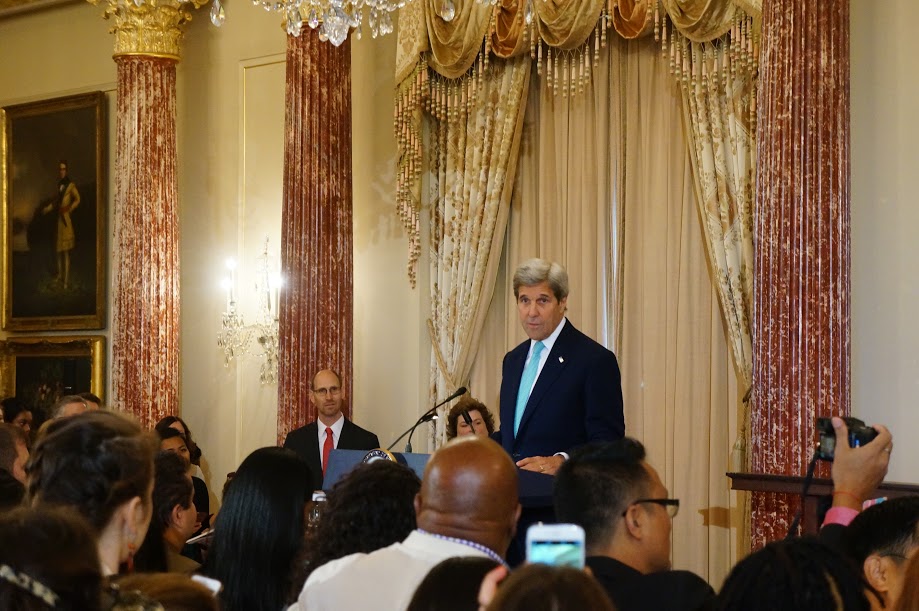U.S. Secretary of State John Kerry says the magnitude of human trafficking is “stunning” and “outrageous.”
“This is the 21st century,” he said, “we know that human civilization has had thousands of years to develop and make progress and establish rules, discern the difference between right and wrong.”
Kerry’s comments came as he unveiled the 2016 Trafficking in Persons (TIP) Report at the State Department in Washington. The 16th annual edition rates how well 188 countries and territories are combating human trafficking and modern slavery.
“It is not,” Kerry emphasized, “just a catalogue of abuses. It is a detailed analysis of the challenges that we face. It’s a targeted road map to measure how we can better overcome the challenges. And it is a clarion call to each of us and everybody in the world to do all we can to eradicate these horrors and to hold countries accountable to a higher and better standard of behavior.” See video here.

Secretary of State John Kerry releases the 2016 TIP Report at the U.S. State Department | Photo: FTS/Shimeng Tong
The report places countries on one of three tiers, based on the effectiveness of each nation’s response to slavery. Tier one is considered the best, and tier three is the worst.
The downgrade of two countries this year is being applauded by the Alliance to End Slavery and Trafficking (ATEST), a consortium of leading human rights organizations, including Free the Slaves.
“The TIP report should provide an honest assessment of human trafficking and forced labor in each country. After last year’s politically motivated rankings, we were watching this year’s TIP report closely and we are glad that the State Department got it right with several key downgrades,” said Kristen Abrams, acting director of ATEST. “Burma’s downgrade is an honest reflection of its lack of progress in addressing human trafficking and we are pleased this reality was not outweighed by other political considerations with the newly-democratic country. We are equally encouraged by the State Department’s decision to downgrade Uzbekistan: no country that engages in state-orchestrated forced labor should be placed anywhere but on Tier 3.”
The ATEST coalition does not agree, however, with the upgrade of Thailand and decision to maintain Malaysia’s current rating.
“Thailand’s lack of policy implementation and meaningful change on the ground calls for the lowest Tier 3 ranking. We are concerned that the State Department let Thailand’s vague policies and promises influence this year’s ranking,” said Abrams. “Malaysia’s upgrade last year was unjustified then and placement on the Tier 2 Watch List remains unjustified today. More than a year after the discovery of mass graves of trafficking victims along the Malaysia-Thailand border, there is little evidence that Malaysia has taken anything more than meager steps to address its troublesome human trafficking situation,” said Abrams.
While releasing this year’s report, Secretary Kerry focused on two distinct forms of slavery: fishing and domestic servitude. Abuses on the high seas and behind closed doors in wealthy homes have prompted the State Department to craft two documents designed to be used as models to reduce these forms of enslavement. The first is a model contract for domestic workers, which can help set standards and practices to ensure that domestic workers aren’t lured by false promises and then trapped in domestic servitude. The second is a model bilateral agreement that nations can use to set labor standards for those who are migrating internationally in search of work.
The United States received a top Tier 1 ranking for the seventh consecutive year. Last year, Congress closed an 85-year-old trade loophole that allowed goods made from slave labor to be imported into the U.S.
“Despite the top ranking, more work is needed to combat human trafficking at home,” says the ATEST coalition. “Efforts to pass legislation to protect vulnerable runaway and homeless youth from trafficking have stalled in Congress, while funding to meet the scale of human trafficking in the U.S. remains far short of the need.”
“President Obama has made significant efforts to combat human trafficking and forced labor over the past eight years but his legacy on modern slavery may be overshadowed by the politicization of last year’s TIP report and failure to make a strong course correction this year,” said Abrams. “To prevent this from happening in the future, Congress should intervene and ensure that the State Department bases its rankings of countries’ anti-trafficking efforts on credible evidence, not politics.”
News coverage: Reuters | Bangkok Post | CNN | Washington Post | New York Times | The Guardian | VOA | The Diplomat | Ghana Business News



